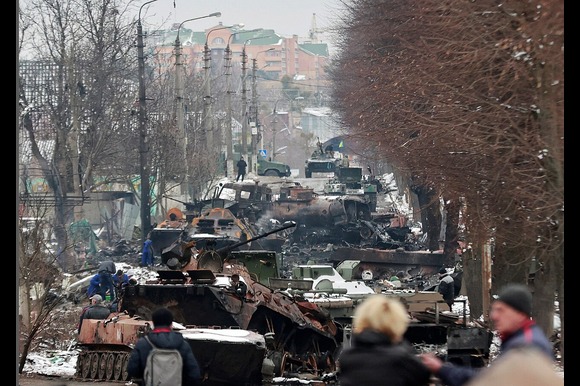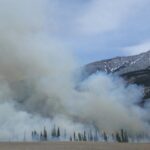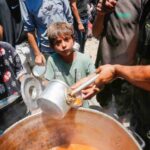European leaders have issued a strong warning against any attempt to redraw Ukraine’s borders through military aggression—just three days before Russian President Vladimir Putin and U.S. presidential candidate Donald Trump are due to meet in Alaska for a summit focused on Ukraine.
In a joint statement signed by 26 of the European Union’s 27 leaders, the bloc declared that “the people of Ukraine must have the freedom to decide their future,” underscoring the core principles of territorial sovereignty and international law. “International borders must not be changed by force,” the statement read.
Notably absent from the list of signatories was Hungary’s Prime Minister Viktor Orban, who has cultivated close ties with Moscow and repeatedly sought to block or dilute European support for Kyiv. His absence further highlights divisions within the EU and reflects the growing anxiety across the continent over Moscow’s actions in Ukraine.
European fears are particularly acute in nations bordering Russia or in countries where memories of Soviet domination remain fresh. In response to Russia’s aggression, Finland and Sweden have joined NATO, Baltic nations have reinstated military conscription, and Poland has committed billions of euros to constructing a defensive barrier along its border with Russia.
These actions reflect mounting concerns that the U.S. may entertain an agreement allowing territorial concessions to Russia. European leaders remain adamantly opposed to any legal recognition of Russia’s sovereignty over Ukrainian territory seized by force. Such a move, they argue, would not only violate international law but could set a dangerous precedent for future conflicts.
Donald Trump has previously suggested that any peace settlement would likely involve “some swapping of territories.” According to reports, this could see Russia officially annexing the entire Donbas region in eastern Ukraine, as well as retaining Crimea, which it annexed in 2014. In return, Russia would be expected to relinquish its partial control of the Kherson and Zaporizhzhia regions.
NATO Secretary General Mark Rutte addressed the issue last week, acknowledging that some Ukrainian territories may remain under Russian control for the time being. However, he emphasized that such control must not be legally or internationally recognized. Formal recognition would require a constitutional amendment in Ukraine—a process that includes a national referendum authorized by the Ukrainian parliament. That process presents significant political risks and could potentially trigger the collapse of President Volodymyr Zelensky’s government.
“This is why at present, no-one is talking about international formal recognition,” analyst Professor Mark Galeotti told the BBC’s Today programme. “We would be recognising that for the moment Russia does control almost 20% of Ukraine, but international borders remain what they are.” He added that Zelensky may be forced to tolerate Russia’s de facto control over occupied areas without altering the Ukrainian constitution.
The EU statement further warned that “Russia’s war of aggression against Ukraine has wider implications for European and international security,” and called for a “just and lasting peace.” European leaders reaffirmed Ukraine’s right to self-defence and pledged continued military aid, declaring that Kyiv was “exercising its inherent right of self-defence.”
They also reiterated the EU’s commitment to Ukraine’s future within the European bloc: “The European Union underlines the inherent right of Ukraine to choose its own destiny and will continue supporting Ukraine on its path towards EU membership.”
Yet the unity of the declaration was subtly undermined by a footnote stating that “Hungary does not associate itself with this statement.”
Prime Minister Orban defended his decision not to sign, posting on social media that the statement amounted to imposing conditions on a summit to which the EU was not even invited. He cautioned fellow leaders against “providing instructions from the bench” and called instead for the EU to initiate its own summit with Russia—despite the fact that EU leaders have boycotted direct talks with Moscow since Russia launched its full-scale invasion in February 2022.
On Monday, Trump revealed he had recently consulted Orban about Ukraine’s battlefield prospects. “He looked at me like, ‘What a stupid question,’” Trump recalled, suggesting that Orban believed Russia would ultimately prevail through continued military pressure.
Meanwhile, President Zelensky expressed doubt about Russia’s intentions in seeking peace, claiming the Kremlin was instead preparing for renewed offensive operations. “On the contrary, they are making movements that indicate preparations for new offensive operations,” he posted on social media.
Ukraine’s military has acknowledged a “difficult and dynamic” situation near the town of Pokrovsk in the Donetsk region but downplayed reports that Russian forces had made a significant breakthrough to the north of the strategic logistics hub.
As Trump and Putin prepare for their summit in Alaska on Friday, EU leaders are expected to hold a separate round of talks with Trump on Wednesday. UK Prime Minister Sir Keir Starmer is also set to join the call. Speaking on Monday, Starmer emphasized that any peace must be “built with Ukraine, not imposed upon it.”
European leaders are expected to use the upcoming dialogue with Trump to emphasize the stakes for European security and to press for any peace agreement to prioritize Ukraine’s sovereignty and democratic choices. Their growing concern is that any settlement imposed without Ukrainian input may ultimately be neither “just” nor “lasting.”






